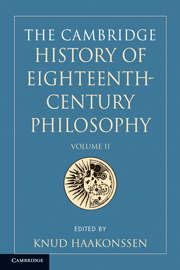32 - The Foundations of Morality
from V - Moral Philosophy
Published online by Cambridge University Press: 28 March 2008
Summary
BRITAIN
Introduction
In the seventh and final part of his Theory of Moral Sentiments, Adam Smith reviews ‘the most celebrated and remarkable of the different theories which have been given concerning the nature and origin of our moral sentiments’. Nearly all earlier theories agree, he suggests, in one important respect: ‘they are all of them … founded upon natural principles’. He then adds that, in analysing moral theories, we should consider their answers to two questions: (1) ‘wherein does virtue consist?’ and (2) ‘by what power or faculty of mind is it that virtue is recommended to us?’ In the course of his review of answers to the first of these questions, Smith discusses four different theories: the theory that traces morality to propriety; that which traces it to prudence; and that which traces it to benevolence. He then compares these three theories with a fourth, or what he calls the ‘licentious system’. He describes this fourth system as a theory that has its ‘real foundation’ in a misguided understanding of popular asceticism. The proponents of this system, he says, attempted ‘to prove that there was no real virtue’ and that ‘what pretended to be [virtue], was a mere cheat and imposition upon mankind’. But however ‘groundless’ this licentious theory really is, Smith argues, it ‘must have had some foundation’, even a ‘foundation in nature’; otherwise its fraudulent character would immediately have been perceived by everyone (VII.ii.4.12 and 14).
- Type
- Chapter
- Information
- The Cambridge History of Eighteenth-Century Philosophy , pp. 939 - 986Publisher: Cambridge University PressPrint publication year: 2000
References
- 5
- Cited by



